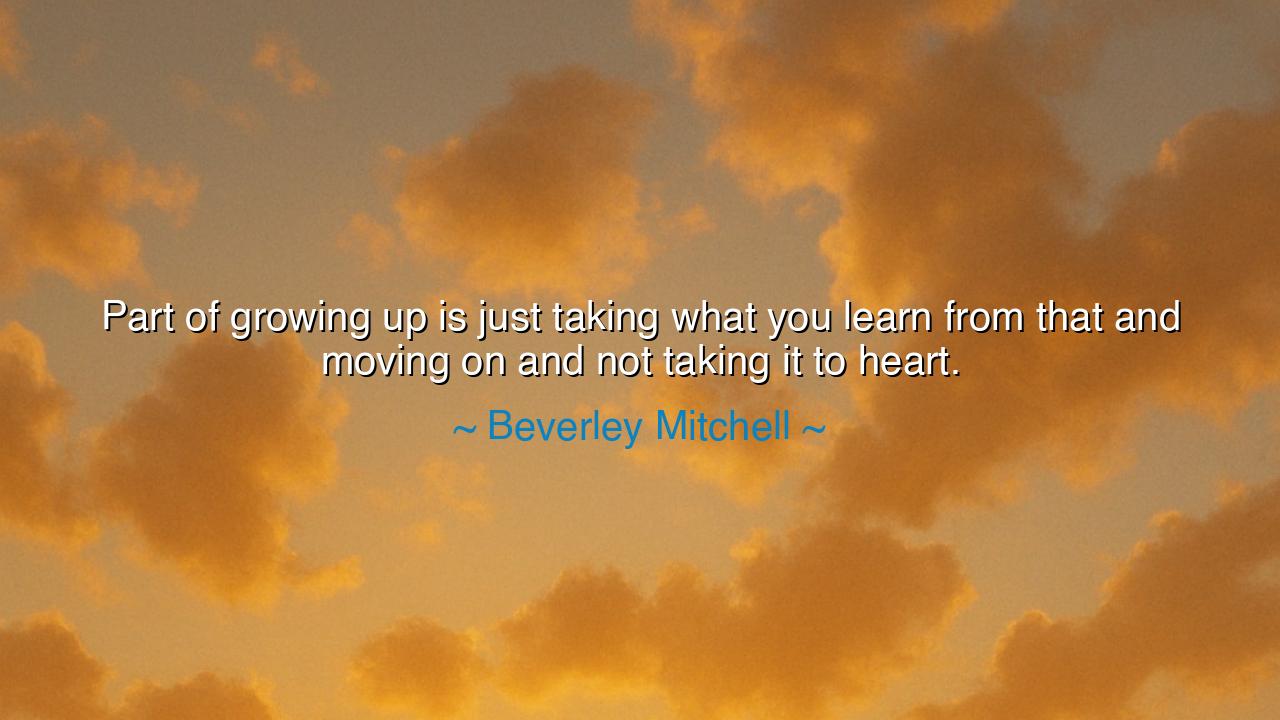
Part of growing up is just taking what you learn from that and
Part of growing up is just taking what you learn from that and moving on and not taking it to heart.






Hear the gentle but enduring wisdom of Beverley Mitchell: “Part of growing up is just taking what you learn from that and moving on and not taking it to heart.” In these words lies a truth as old as time—that the journey of maturity is not about avoiding mistakes or escaping hardship, but about transforming them into teachers. For life will place before every soul trials, missteps, and wounds. To carry them forever in the heart as bitterness is to be weighed down by chains; but to take the lesson and then walk forward is to grow in strength and freedom.
Growing up is not merely the passing of years, but the refining of spirit. Many are aged in body yet remain children in soul, because they clutch too tightly to every slight, every mistake, every sorrow. The mature, however, understand that life is not meant to be lived in regret. They gather the wisdom hidden in their hardships, then release the pain, as a farmer gathers grain but leaves behind the chaff. In this way, they rise lighter, freer, and more prepared for the path ahead.
The ancients knew this rhythm well. The Stoics taught that events themselves are not our masters—it is how we respond to them that determines our peace. To “not take it to heart” is not to dismiss life’s lessons, but to refuse to let wounds poison the spirit. Marcus Aurelius, emperor and philosopher, wrote daily reminders to himself: “What stands in the way becomes the way.” Each setback carried its wisdom, but he did not linger in bitterness. He took the teaching, then moved forward to govern with clarity.
Consider the tale of Thomas Edison. He failed thousands of times before perfecting the electric light. Had he taken each failure to heart, despair would have crushed him. Instead, he chose to see every attempt as a lesson, saying, “I have not failed, I’ve just found 10,000 ways that won’t work.” From this spirit of moving forward came one of the greatest inventions of the modern age. Edison’s life mirrors Mitchell’s teaching: learn, but do not let failure lodge in the heart as shame.
Yet we must see also the danger of the opposite. Those who take every word, every rejection, every stumble too deeply to heart often imprison themselves. Their minds replay old wounds, their growth is stunted, and their joy is muted. To grow up is to release such burdens, to say, “This taught me, but it does not define me.” For the heart cannot hold the weight of all sorrows—some must be set down if the soul is to walk freely.
What lesson must you take from this? When hardship comes, do not deny it; feel it, learn from it, but then let it pass through you. Ask yourself: “What wisdom is hidden here?” Then hold fast to that wisdom and release the pain. This is the true art of maturity—not to harden the heart in denial, nor to let it drown in sorrow, but to balance between the two: learning without being consumed.
Practical actions are clear: at the end of each day, reflect on what events taught you. Write the lesson down, then consciously release the sting of the moment. When others wound you with words, ask yourself whether their words are worth carrying. If not, let them go like leaves in the wind. When you fail, name the lesson, then step forward, refusing to let the heart be shackled by regret. In this way, each day becomes a stepping stone upward, not a weight pulling you back.
Thus remember Mitchell’s wisdom: growing up is not about carrying everything—it is about choosing what to keep. Take the lesson, leave the sorrow, and move on with courage. For the one who learns but does not linger will rise higher with each trial, and their life will shine not with the heaviness of regret, but with the lightness of wisdom gained and freedom embraced.






AAdministratorAdministrator
Welcome, honored guests. Please leave a comment, we will respond soon